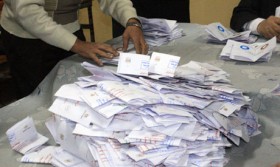 While the Egypt’s Shura Council ( upper house of the parliament) has sent a new revised election law to the Supreme Constitutional Court (SCC) to hasten its decision over the law legality, analysts believe the court is likely to ask for amendments, which will delay the election process and give more time for political forces to enlarge its popularity base.
While the Egypt’s Shura Council ( upper house of the parliament) has sent a new revised election law to the Supreme Constitutional Court (SCC) to hasten its decision over the law legality, analysts believe the court is likely to ask for amendments, which will delay the election process and give more time for political forces to enlarge its popularity base.
Egypt’s Islamist-dominated upper house has approved a revised election law on April 11 setting the rules for a parliamentary poll later this year, and the council which is entitled temporarily with the country legislative authority, sent the text to the SCC to check the legality of the voting procedures for the representative council (lower house of the parliament). The court has 45 days to review the bill.
The Shura council didn’t wait for the SCC opinion over the former election law because the court didn’t abide by specific time to return the law after it was referred by another court, but when the Shura council send a new law, the SCC is abided to return it back within 45 days with its decision according to the law, said Abdel Ghaffar Shokr, a political expert and member of the main opposition bloc National Salavation Front (NSF) and head of the Popular Alliance party.
“The state’s upper house wants to save time, so the elections could be run in the near future,” Shokr told Xinhua.
The amended elections law stipulated five years for the representative council’s round starting from its first meeting, set the rules for the constituent division, and banned members of the dissolved National Democratic Party (NDP) who were members in the parliament for two consecutive rounds before 2011, from running to the elections.
It also deleted an article which banned using the religious slogans during the election campaigns. The new election bill said those exempted from the military service as convicted in crimes related to the state national security but finished their custody should have the right for running to the coming parliamentary election law.
Mohamed Nour Farahat, professor at Cairo University, said five years for a parliamentary round is consistent with the new drafted constitution, but the constitutional court will ask the Shura council for amendments over other articles.
Deleting the article which banned previously using the religious slogans is controversial because it will prejudice the state’s obligation to establish the elections in an atmosphere of neutrality, Farahat told Xinhua.
“Using the religious slogans will only help the Morsi’s government and his Islamist allies in their effort to dominate all of Egypt’s institutions,” Farahat added.
Using the religious slogans wouldn’t provide equal opportunities in the election competitions, Shokr echoed the legal expert adding the religious slogans are contracting with the principles of the religion itself, as the mosques should be used in calling for the good ethics and not for a political party or people who believe themselves defending the religion.
“In Egypt, we fear of politics influencing the religion, because associating the immoral behaviors of political entities to religion is a crime and a distortion for the religion,” Shokr added.
“A candidate should campaign on how he will help solve the problems of society, not on his religious beliefs,” he added.
This law won’t be endorsed as the court will ask for amending, mainly the articles over dividing the electoral constituencies, using the religious slogans, Shoker added.
The current election law said that even the nominees have been accused of harming the state higher interests but the court didn’t give them a final sentence, could run for the elections.
Hassan Rabie, professor in Constitutional Law at Beni Suef University criticized banning NDP from running to the election politically wise, arguing the difference between the revised law and the former one over this point came upon whether the two periods are consecutive or not.
Though debate over the elections law would negatively delay holding the parliamentary elections and building the country’s institutions, it will give the political forces enough time to build its popularity and enlarge the political freedom spectrum in Egypt. It will be an important step in building a democratic country, Rabie added.
